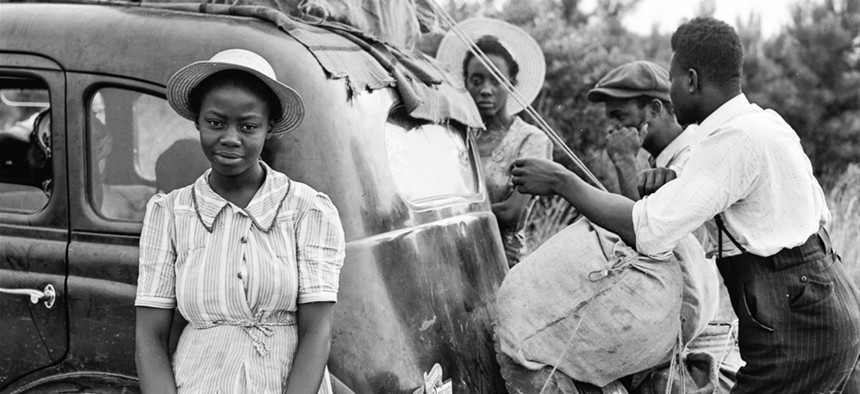Opinion
Bill Cotterell: Yes, Florida teaches Black history, but...
Clearly, whatever political indoctrination or gender fads were mixed into a rejected AP course, Florida isn’t doing an 'equal' job of teaching African American history.

A group of Florida migrants on their way to Cranberry, New Jersey, to pick potatoes, as seen near Shawboro, North Carolina, in July 1940. Photo by Jack Delano/Library of Congress, Public Domain Collection
When his many critics blasted Gov. Ron DeSantis for rejecting an Advanced Placement course in African American studies, the governor and his supporters rightly replied that Florida law specifically requires public schools to include the topic in their regular K-12 curriculum.
It’s not that DeSantis considers Black studies to be lacking in scholarly value, he said, it’s that he found that particular AP program objectionable. The College Board caved, while insisting it was just making minor adjustments on the advice of academic experts. It moved to mollify DeSantis by toning down some stuff about “queer” studies, slavery reparations, the “intersectionality” of race and class in American life, not to mention those three little words that make Republican hearts race, critical race theory.
“We proudly require the teaching of African American history. We do not accept woke indoctrination masquerading as education,” Education Commissioner Manny Diaz Jr. tweeted last month. He said the AP course in African-American Studies “lacked educational value.”
It was a glib alibi that left out more than it explained.
The Miami Herald subsequently reported that, although a 1994 law requires Black history in public schools, the requirement is not well enforced. In fact, only 11 of the state’s 67 school districts have developed plans, trained teachers and worked the course into class schedules.
The Herald said the Education Commissioner’s Task Force on African American Studies has been budgeted the same $100,000 a year, with just one staff member, to develop teaching materials and help teachers instruct students in the course. And the newspaper also said the 12-member task force has eight vacancies. Bernadette Kelley-Brown, an English professor at Florida A&M University and member of the task force, said most school districts limit instruction to February, which is Black History Month.
It’s easily understandable that DeSantis, who proudly proclaims Florida is “where ‘woke’ goes to die,” would want to root out any traces of politically correct fads in Florida’s far-flung higher education system. He is, after all, the governor who hand-picked a new majority of conservative trustees for New College, when he decided the Sarasota campus had become a bit too weird for his strait-laced tastes. He also ordered state campuses to report how much they spend on “diversity, equity and inclusion” in their hiring.
It’s quite possible, even likely, that the academicians of the College Board really did go well beyond presenting facts of history in the AP course spurned last month. Some of it seemed like the organization was baiting DeSantis, to see if all those white Republicans in the Department of Education would dare to reject anything called “Black history.” When they took the dare, the backlash was swift and severe, from the White House, to the liberal ladies of The View, to the rotunda of Florida’s Capitol, where protesters threatened lawsuits against the department’s decision.
In a way, the outcry evokes memories of the “massive resistance” mounted against school integration across the South, and much of the nation, in the 1950s. Back then, governors and members of Congress called it “separate but equal,”claiming they were educating all the kids the same, just not in the same schools.
The courts wouldn’t stand for “separate” in those days and anyone with eyes could see the schools weren’t “equal,” either. As the late comedian Dick Gregory joked, the hand-me-down geography books in his school were so old, they kept him out of the Navy for fear of sailing off the edge of the earth.
Clearly, whatever political indoctrination or gender fads were mixed into the rejected AP course, Florida isn’t doing an “equal” job of teaching Black history. Not when two-thirds of the state’s task force seats are vacant. Not when 56 out of 67 counties haven’t implemented and updated their curricula nearly 30 years after the law requiring it was passed.
Anyone who’s watched DeSantis dominate the Legislature for the last four-plus years can only conclude that if this was important to him, it would get done.
Bill Cotterell is a retired Capitol reporter for United Press International and the Tallahassee Democrat. He can be contacted at bcotterell@cityandstatefl.com.
NEXT STORY: Opinion: Black History Month reminds us to celebrate mentors, inspire next generation
